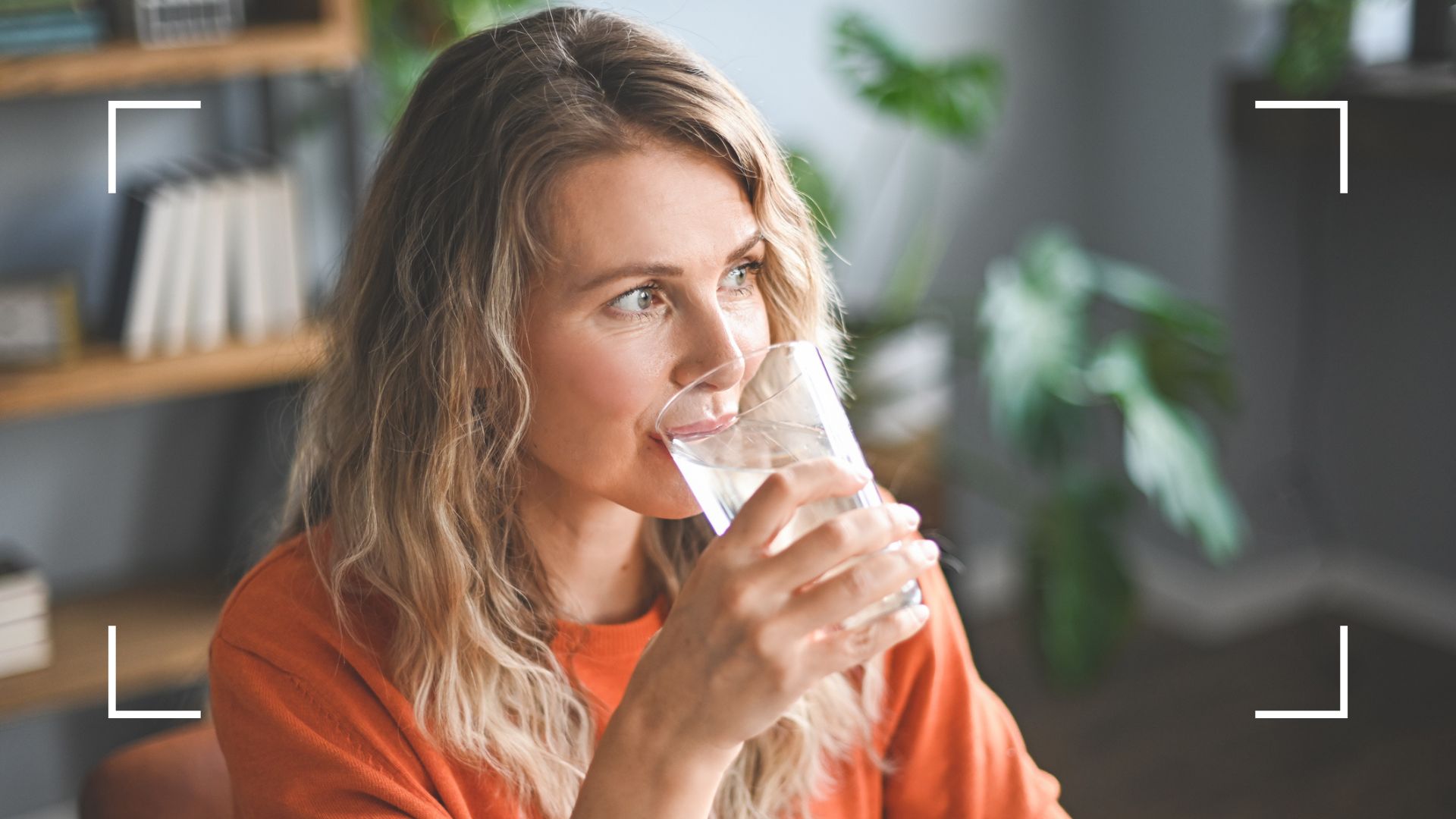Alcohol and menopause: 5 reasons why the combination could be making your symptoms worse
The combination of alcohol and menopause is a difficult one. If you suffer more after drinking less then your hormones might be to blame


Grace Walsh
You might already be familiar with the troublesome combination of alcohol and menopause if a glass of Merlot triggers a migraine, sipping on a G&T leads to a racing heart when you wake up, or you have hangover anxiety - aka hangxiety - after drinking when you never used to.
If this sounds familiar, then alcohol could be aggravating your menopause symptoms. Dry January is in full swing with many people picking up the alternatives to alcohol, but only 10% of those over 55 reportedly take part in the initiative every year, per Alcohol Change. Women aged 45 to 74 (those of us in our meno- and post-menopausal years) have also been found to drink more than younger generations, according to the NHS, so it’s no wonder so many of us are suffering.
We imbibe to relax or reward ourselves, but could our nightcap be hindering instead of helping as we age? Here's what you need to know, plus tips on how to cut down on alcohol if you're looking to change your habits.
Why alcohol and menopause doesn't work
1. Women's bodies respond differently to alcohol
Biology has a lot to answer for here, says Dr Kate Burns, a menopause specialist and GP working with Health & Her. "Thanks to our naturally higher levels of body fat and lower levels of water, women experience a more dramatic physiological response to alcohol because more is absorbed into their bloodstream," she says.
"In addition, women make less alcohol dehydrogenase (ADH), an enzyme that is released in the liver and breaks down alcohol."
Then there’s the double whammy of age and oestrogen decline. "As we age, our bodies lose water volume, so we’re less able to disperse and dilute alcohol, which makes us more vulnerable," adds Dr Burns. "ADH can also diminish, which is why our tolerance may get lower."
Dr Kate Burns qualified as a practicing GP in 2010 and ever since, women’s health has been of specialist interest to her. With previous experience of working in Obstetrics and Gynaecology, and diplomas specialised in sexual and reproductive health, Dr Kate has been dedicated to understanding female reproductive health. She currently works with Health & Her.
2. Liver function decreases with age
And that’s not all when it comes to alcohol and menopause. "Low oestrogen [which occurs as a result of menopause] may promote liver fibrogenesis, which leads to cellular ageing," says Dr Melina Stasinou, a specialist in functional gynaecology at the Marion Gluck Clinic. "Liver volume and function decrease by 1% per year after 40 to 50 years, which is more marked in women."
Sign up to our free daily email for the latest royal and entertainment news, interesting opinion, expert advice on styling and beauty trends, and no-nonsense guides to the health and wellness questions you want answered.
While cutting back on drinking won't reverse this process, it's no secret that better liver health and a lower risk of serious diseases like cancer are two of the many benefits of not drinking alcohol.
Dr Melina Stasinou is a doctor with the Marion Gluck Clinic, a certified specialist in Functional Gynaecology, and a member of numerous medical organisations in UK and abroad (HCCP, BFS, ESHRE, Cochrane Group, ASRM), and assistant member of Royal College of Obstetricians and Gynaecologists.

3. The brain reacts differently to alcohol during menopause
When it comes to feelings of anxiety after drinking, also known as 'hangxiety', the combination of alcohol and menopause is a potent cause. "Drinking alcohol stimulates GABA receptors, which calm the brain," says Dr Burns. "When you get to the third or fourth drink, you start blocking glutamate, the main excitatory transmitter in the brain. However, later on, the body recognises this imbalance and attempts to put things right."
Your body is intent on bringing GABA levels down and turning glutamate back up, she explains. "So, when you stop drinking, you end up with unnaturally low GABA function and a spike in glutamate." This can lead to anxiety, and it can take the brain a day or two to get back to normal.
The link between menopause and anxiety is an established one too, with symptoms commonly emerging as levels of progesterone and oestrogen decline.
4. Hot flushes can become more common with regular drinking
It's not only the following day that you may suffer from your drinking. While some find that alcohol reduces their symptoms, others find that hot flushes and migraines are a guarantee post-drinking even if they've only had one or two glasses.
This effect of alcohol and menopause is down to blood dilation. With wider blood vessels, the skin feels warmer and so the sweat glands kick into action, producing a hot flush.
There is evidence to suggest that alcohol has the opposite effect too, of course. For example, researchers from the University of Barcelona have found that the hops and nutrients found in beer may relieve symptoms and two studies - linked to the University of Maryland - found that women who drank alcohol at least once a month were less likely to have hot flushes than those who avoided drinking entirely. As the saying goes: everything in moderation, so learning how to avoid alcohol as and when you want to may be helpful as well.
5. Alcohol prevents good sleep
It might be easier to get to sleep after a couple of glasses of wine but research from Tampere University of Technology shows that it greatly diminishes the quality of the sleep as the enzymes in the liver work to break down the alcohol.
Many women also struggle to sleep while going through menopause and in the post-menopausal years. There are a couple of explanations for this but scientists (including those from the University of Massachusetts) tend to put it down to increased wakefulness, which means other symptoms like night sweats become more bothersome.
The two together, needless to say, are a recipe for a bad night's sleep. In turn, this can play havoc with overall wellbeing during the day, heightening feelings of stress and anxiety, and hangover symptoms if you have one too many, like nausea, brain fog, and headaches. Better sleep is just one of the many things that happen when you stop drinking alcohol.
How to minimise hangovers in menopause
20% of UK adults reportedly think about their alcohol consumption and reducing it at least once a day, according to a survey conducted with Freestar. If you're one of them, here are the expert's tips on cutting down on alcohol or even giving it up completely:
- Take the 'less is more' approach: As we age, loss of water through cartilage and tendons makes it difficult for us to dilute alcohol.
- Choose non- or low-alcohol alternatives to your usual tipple: Whether it's a pick of the best non-alcoholic spirits as a replacement for the classic G&T or a non-alcoholic drink in a can at a friend's house, having alternatives you genuinely enjoy makes all the difference.
- Opt for white spirits: Drinks like brandy, red wine, and dark rum contain chemicals irritating the blood vessels.
- Check the label: Buy sulphite-free and low-tannin wines as sulphites and tannins can be another cause of headaches.
- Swap out the prosecco: Choosing low-calorie beer over prosecco may be a better option for some people as the polyphenols in hop and beer may help to relieve hot flushes.
For some, the only solution to worsening hangovers is to learn how to stop drinking alcohol for good. This was the case for Janey Lee Grace, founder of The Sober Club. "I wasn’t at rock bottom, but the anxiety definitely got worse," she tells woman&home. "I often had a fuzzy headache, was irritable, bloated and always hot. I felt fearful and panicky. I now see that my mood swings and anxiety were exacerbated by alcohol."
Once she stopped drinking, almost everything got better. "I realised how much it had made my menopausal symptoms worse," she says, advising those in a similar boat to ask themselves: 'Could my life be better without booze?'
"If the answer is 'yes', give it a go," she suggests. "Your skin clears, you have a 'sober glow', and you feel a sense of clarity and confidence. I used to think a large glass of wine was self-care, now I’ve replaced it with walks, baths, yoga or something creative. Focus on what you’re adding in: nutrition, connection, positivity. You’re not giving anything up – you’re only gaining."
Debra Waters is an experienced online editor and lifestyle writer with a focus on health, wellbeing, beauty, food and parenting. Currently, she writes for the websites and Woman&Home and GoodtoKnow, as well as the Woman, Woman’s Own and Woman’s Weekly magazines.
Previously, Debra was digital food editor at delicious magazine and MSN. She’s written for M&S Food, Great British Chefs, loveFOOD, What to Expect, Everyday Health and Time Out, and has had articles published in The Telegraph and The Big Issue.
- Grace WalshHealth Channel Editor
